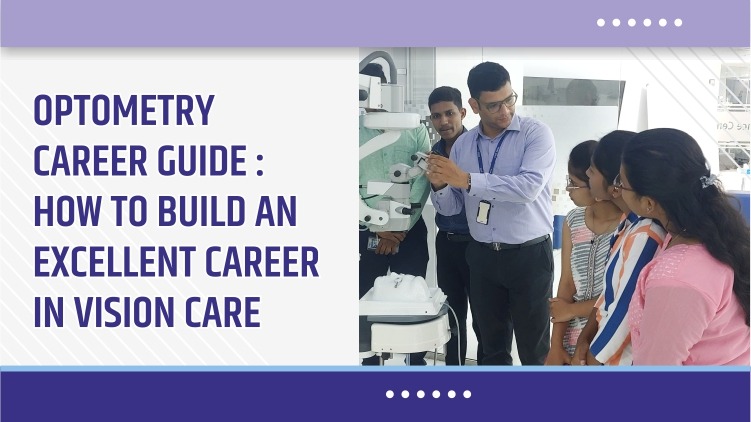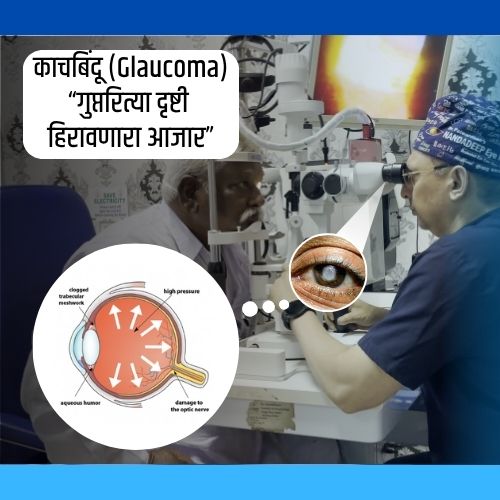Optometry Career Guide: How to Build an Excellent Career in Vision Care

Introduction
What is Optometry?
Why Choose a Career in Optometry?
1. Growing Demand
As more people use digital devices and work online, eye problems are becoming more common. Older people also face vision issues as they age, adding to this trend. Because of these reasons, the need for eye care is increasing and will keep growing.
2. Job Satisfaction
Optometrists work to improve the vision of their patients, which increases their quality of life, and gives them job satisfaction of bringing change in someone’s life.
3. Financial Stability
ptometry provides chances for business expansion and competitive pay.
4. Work-Life Balance
Optometrists, in contrast to many other medical specialities, frequently have flexible work schedules and a balanced lifestyle.
5. Possibilities for Specialisation
Contact lenses, pediatric optometry, low vision rehabilitation, neuro vision rehabilitation and other fields are among the specialisations available to optometrists.
(presbyopia).
Tip – Looking for an optometry school that offers both academic excellence and clinical exposure? Nandadeep School of Optometry provides the perfect balance to kickstart your career with confidence!
Educational Pathway to Become an Optometrist
To become an Optometrist, students must have a Science Background (Physics, Chemistry, Biology) after the 12th grade. There are several educational pathways:
- Bachelor’s in Optometry (B.Optom) (4 years)
- Optometry Fellowship (12 months)
- Master’s in Optometry (M.Optom) (2 years)
- Ph.D. in Optometry (Research-based programs)
Skills Required to Become a Successful Optometrist
An optometrist needs to have both technical and soft skills, including:
- Excellent communication skills in interacting with patients
- Analytical skills to detect and diagnose vision-related issues
- Attention to detail for precision in eye examination
- Problem-solving ability for effective patient care
- Business acumen for those interested in private practice
Career Opportunities in Optometry
- Establishing a private optometric clinic as an independent eye care practitioner.
- Clinical optometrists work in specialty eye clinics or hospitals.
- Faculty in optometry: Educating students at optometry schools and universities.
- Corporate Sector: Collaborate with globally renowned companies like Alcon, Carl Zeiss, and EssilorLuxottica, which are leaders in diagnostic instruments, contact lenses, and ophthalmic lenses, as well as well-known Indian companies like Aurolab and Appasamy Associates.
- An ophthalmic officer in a government job provides vital eye care services to the public, often focusing on diagnosing and treating eye conditions, promoting eye health, and ensuring accessible vision care within the community through government healthcare programs.
- Occupational optometry is the practice of working in industries to protect employees’ eyes.
- Community optometrist: Using government and non-profit initiatives to provide primary eye care services in underprivileged areas.
- Research and Development: Supporting advancements in eye care technology and vision sciences.
Salary & Career Growth in Optometry
- Entry-Level: New graduates should anticipate earning between ₹3 and ₹5 lakhs annually.
- Mid-Level: Optometrists make between ₹6 and 10 lakhs a year with experience.
- Senior-Level: Highly skilled professionals can make ₹12–20 lakhs a year or more, particularly those working in corporate or private practice.
Specialisation, experience, and the type of employer—hospital, private practice, corporate, or independent clinic—all affect optometry’s salary growth, with specialists and seasoned professionals making significantly more.
Challenges and Future Trends in Optometry
- Challenges: Optometrists may face competition from unqualified practitioners, difficulty in setting up a private clinic, and limited awareness about the profession.
- Future Trends: Advancements in AI, tele-optometry, and myopia control techniques are shaping the future of optometry.
Questions and Answers (FAQS)
- Is optometry a viable option for a career in India?
Indeed! Optometry is a rewarding and promising career because of the growing demand for eye care services. - What distinguishes a diploma in optometry from a B.Optom?
In-depth knowledge and improved career prospects are provided by a bachelor’s degree, while a diploma is more skill-based and may not allow for as much advancement. - After optometry, is it possible to become an ophthalmologist?
No, ophthalmologists are medical professionals who hold an MBBS and an MS/MD in ophthalmology, while optometrists concentrate on managing eye health and providing vision care. To become an ophthalmologist, you must specialise in ophthalmology after earning your MBBS. Instead, optometrists can advance their careers by earning a PhD, an M.Optom, or specialisations in areas like contact lenses, binocular vision, neuro vision and low vision therapy. - How much money does it take to open an eye clinic?The size, location, and equipment of the clinic all affect the price; a basic setup typically costs between ₹5 and 15 lakhs. A fully equipped clinic with state-of-the-art diagnostic tools may cost more.
- Which nations offer the best employment opportunities for optometrists?The United States, Canada, Australia, and the United Kingdom all offer excellent career options if you wish to work abroad. You must pass licensing exams like the NBEO (USA), OCAN (Canada), AHPRA (Australia), or GOC (UK) to practice lawfully.
In conclusion
Optometry is a fantastic career choice for those who are passionate about eye care and the sciences of vision. With increasing demand and a wide range of career opportunities, the field offers exceptional financial stability and professional fulfilment. The first step in pursuing a career in optometry is choosing the right course and school—and that’s where Nandadeep School of Optometry stands out. Renowned for its comprehensive curriculum, expert faculty, and state-of-the-art clinical training, Nandadeep equips students with the skills and knowledge needed to excel in the field. As the demand for skilled professionals continues to rise, Nandadeep School of Optometry is the ideal launchpad for a successful and rewarding career in eye care.
More Posts

Everything You Should Know About Pediatric Eye Exams

काचबिंदू (Glaucoma): नियमित नेत्रतपासणी का आवश्यक आहे?










